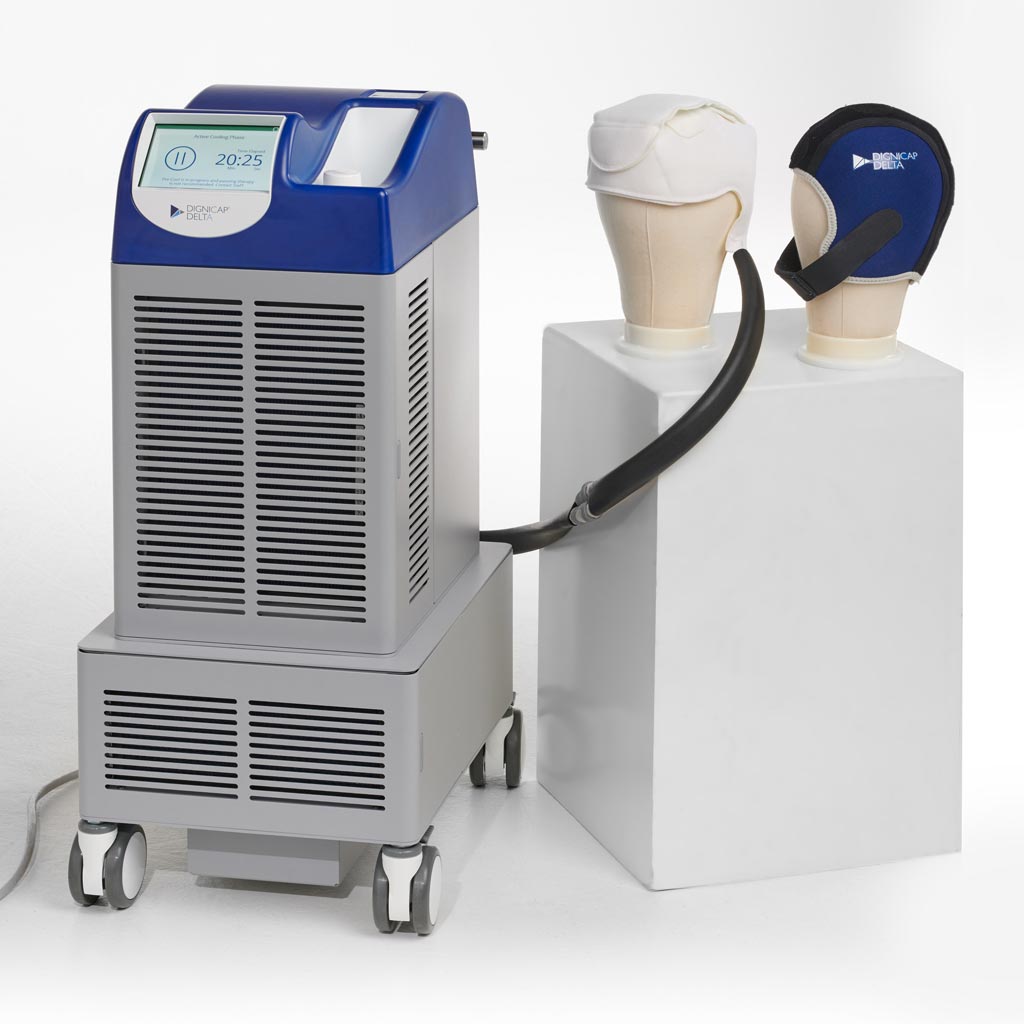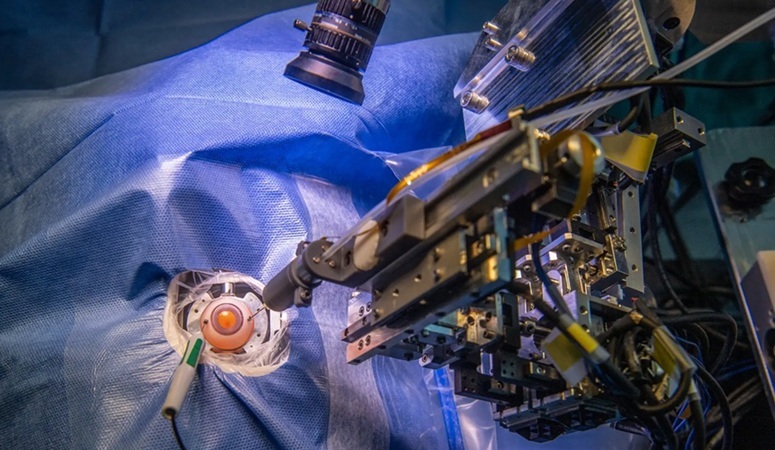Scalp Cooling System Reduces Cancer Patients Hair Loss
|
By HospiMedica International staff writers Posted on 02 Jul 2019 |

Image: The fourth-generation DigniCap Delta scalp cooling system (Photo courtesy of Dignitana).
A fourth-generation medical cooling device offers cancer patients the ability to minimize alopecia (hair loss) during chemotherapy treatments.
The Dignitana (Lund, Sweden) DigniCap Delta scalp cooling system is indicated for the prevention of chemotherapy-induced hair loss in patients with solid tumors. The system works by circulating liquid coolant through a flexible cooling wrap and an adjustable thermal cap that optimize scalp cooling outcomes. The cooling wrap is placed directly on the head to deliver consistent, controlled cooling to the scalp, while the outer thermal neoprene cap insulates and secures it tightly in place, with two built-in sensors continuously monitoring scalp temperature in order to maintain optimal cooling throughout.
Key system features include a quick-disconnect to accommodate bathroom breaks, an intuitive touch screen interface to simplify system operation, and flash memory that makes it possible to save data from each scalp cooling treatment and facilitates software upgrades. A built-in safety sensor ensures cooling temperature does not drop below freezing point. The cooling cap itself is available in multiple sizes to insure a personalized fit, and has a smooth inner surface to enable optimal contact between scalp and cap. Two independently controlled systems can be used for simultaneous treatment of two patients.
“DigniCap Delta changes everything about the way scalp cooling is done today. We are thrilled to offer patients and clinicians this state-of-the-art advancement in cancer care,” said William Cronin, CEO of Dignitana. “The clearance of Delta now provides a clear pathway for growth in the important US market and beyond. It is the biggest step yet in the evolution of Dignitana, and is the result of a tremendous effort from our staff, partner sites, regulatory team and contract manufacturer.”
As the temperature of the scalp is lowered, the subsequent blood vessel vasoconstriction reduces the amount of chemotherapy agents that reach it, as well as reducing uptake of drugs in the hair follicles due to decreased intra-follicular metabolic rate. The combined actions are thought to reduce the effect chemotherapy has on the cells, which may reduce hair loss.
Related Links:
Dignitana
The Dignitana (Lund, Sweden) DigniCap Delta scalp cooling system is indicated for the prevention of chemotherapy-induced hair loss in patients with solid tumors. The system works by circulating liquid coolant through a flexible cooling wrap and an adjustable thermal cap that optimize scalp cooling outcomes. The cooling wrap is placed directly on the head to deliver consistent, controlled cooling to the scalp, while the outer thermal neoprene cap insulates and secures it tightly in place, with two built-in sensors continuously monitoring scalp temperature in order to maintain optimal cooling throughout.
Key system features include a quick-disconnect to accommodate bathroom breaks, an intuitive touch screen interface to simplify system operation, and flash memory that makes it possible to save data from each scalp cooling treatment and facilitates software upgrades. A built-in safety sensor ensures cooling temperature does not drop below freezing point. The cooling cap itself is available in multiple sizes to insure a personalized fit, and has a smooth inner surface to enable optimal contact between scalp and cap. Two independently controlled systems can be used for simultaneous treatment of two patients.
“DigniCap Delta changes everything about the way scalp cooling is done today. We are thrilled to offer patients and clinicians this state-of-the-art advancement in cancer care,” said William Cronin, CEO of Dignitana. “The clearance of Delta now provides a clear pathway for growth in the important US market and beyond. It is the biggest step yet in the evolution of Dignitana, and is the result of a tremendous effort from our staff, partner sites, regulatory team and contract manufacturer.”
As the temperature of the scalp is lowered, the subsequent blood vessel vasoconstriction reduces the amount of chemotherapy agents that reach it, as well as reducing uptake of drugs in the hair follicles due to decreased intra-follicular metabolic rate. The combined actions are thought to reduce the effect chemotherapy has on the cells, which may reduce hair loss.
Related Links:
Dignitana
Latest Critical Care News
- CPR Guidelines Updated for Pediatric and Neonatal Emergency Care and Resuscitation
- Ingestible Capsule Monitors Intestinal Inflammation
- Wireless Implantable Sensor Enables Continuous Endoleak Monitoring
- Pulse Oximeter Index Offers Non-Invasive Guides for Fluid Therapy
- Wearable Patch for Early Skin Cancer Detection to Reduce Unnecessary Biopsies
- 'Universal' Kidney to Match Any Blood Type
- Light-Based Technology to Measure Brain Blood Flow Could Diagnose Stroke and TBI
- AI Heart Attack Risk Assessment Tool Outperforms Existing Methods
- Smartphone Imaging System Enables Early Oral Cancer Detection
- Swallowable Pill-Sized Bioprinter Treats GI Tract Injuries

- Personalized Brain “Pacemakers” Could Help Patients with Hard-To-Treat Epilepsy
- Microscopic DNA Flower Robots to Enable Precision Medicine Delivery
- Origami Robots to Deliver Medicine Less Invasively and More Effectively
- Improved Cough-Detection Technology Aids Health Monitoring
- AI Identifies Children in ER Likely to Develop Sepsis Within 48 Hours
- New Radiofrequency Therapy Slows Glioblastoma Growth
Channels
Surgical Techniques
view channel
Robotic Assistant Delivers Ultra-Precision Injections with Rapid Setup Times
Age-related macular degeneration (AMD) is a leading cause of blindness worldwide, affecting nearly 200 million people, a figure expected to rise to 280 million by 2040. Current treatment involves doctors... Read more
Minimally Invasive Endoscopic Surgery Improves Severe Stroke Outcomes
Intracerebral hemorrhage, a type of stroke caused by bleeding deep within the brain, remains one of the most challenging neurological emergencies to treat. Accounting for about 15% of all strokes, it carries... Read morePatient Care
view channel
Revolutionary Automatic IV-Line Flushing Device to Enhance Infusion Care
More than 80% of in-hospital patients receive intravenous (IV) therapy. Every dose of IV medicine delivered in a small volume (<250 mL) infusion bag should be followed by subsequent flushing to ensure... Read more
VR Training Tool Combats Contamination of Portable Medical Equipment
Healthcare-associated infections (HAIs) impact one in every 31 patients, cause nearly 100,000 deaths each year, and cost USD 28.4 billion in direct medical expenses. Notably, up to 75% of these infections... Read more
Portable Biosensor Platform to Reduce Hospital-Acquired Infections
Approximately 4 million patients in the European Union acquire healthcare-associated infections (HAIs) or nosocomial infections each year, with around 37,000 deaths directly resulting from these infections,... Read moreFirst-Of-Its-Kind Portable Germicidal Light Technology Disinfects High-Touch Clinical Surfaces in Seconds
Reducing healthcare-acquired infections (HAIs) remains a pressing issue within global healthcare systems. In the United States alone, 1.7 million patients contract HAIs annually, leading to approximately... Read moreHealth IT
view channel
Printable Molecule-Selective Nanoparticles Enable Mass Production of Wearable Biosensors
The future of medicine is likely to focus on the personalization of healthcare—understanding exactly what an individual requires and delivering the appropriate combination of nutrients, metabolites, and... Read moreBusiness
view channel
Philips and Masimo Partner to Advance Patient Monitoring Measurement Technologies
Royal Philips (Amsterdam, Netherlands) and Masimo (Irvine, California, USA) have renewed their multi-year strategic collaboration, combining Philips’ expertise in patient monitoring with Masimo’s noninvasive... Read more
B. Braun Acquires Digital Microsurgery Company True Digital Surgery
The high-end microsurgery market in neurosurgery, spine, and ENT is undergoing a significant transformation. Traditional analog microscopes are giving way to digital exoscopes, which provide improved visualization,... Read more
CMEF 2025 to Promote Holistic and High-Quality Development of Medical and Health Industry
The 92nd China International Medical Equipment Fair (CMEF 2025) Autumn Exhibition is scheduled to be held from September 26 to 29 at the China Import and Export Fair Complex (Canton Fair Complex) in Guangzhou.... Read more














